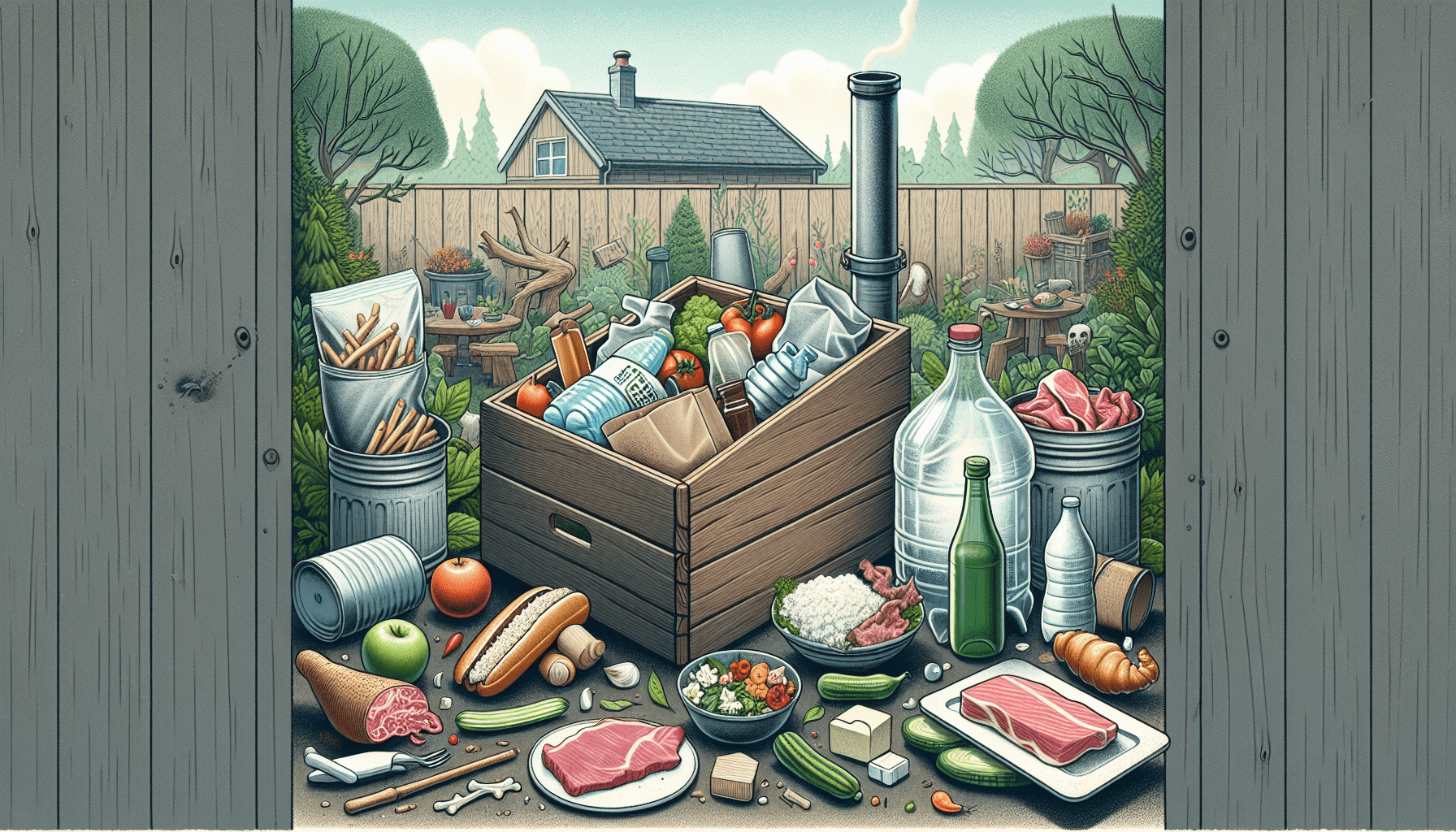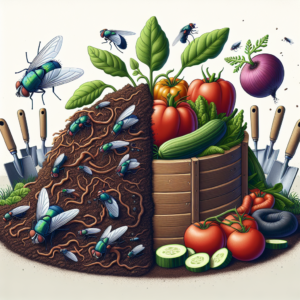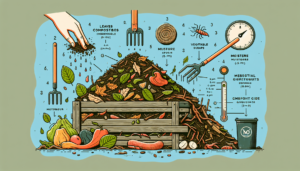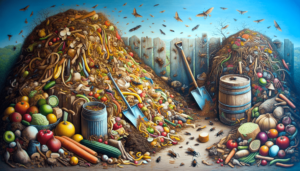In our quest for creating nutrient-rich soil for our gardens, it’s important to know what materials should not be added to a compost pile. While composting is a fantastic way to recycle organic waste and reduce the amount of landfill waste, certain items can cause more harm than good. From meat and dairy products to pet waste and invasive weeds, there are several things we should avoid tossing into our compost piles. By understanding what materials to steer clear of, we can ensure that our composting efforts are successful and our gardens flourish with vitality.
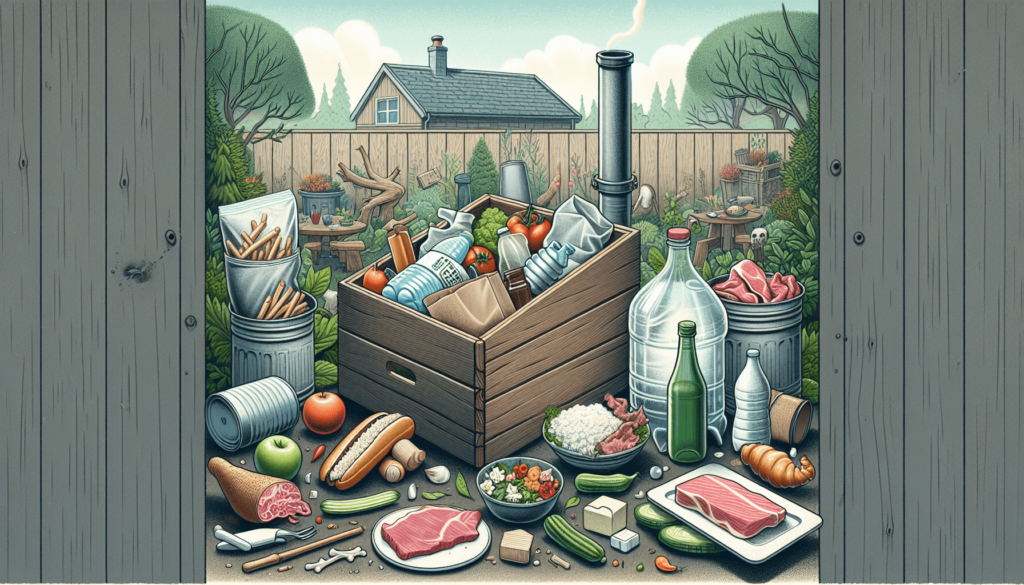
Plastics
Plastic bags
Plastic bags are not suitable for composting. These bags are often made from non-biodegradable materials such as polyethylene, making them resistant to natural decomposition processes. When added to a compost pile, plastic bags can take a significantly long time to break down, which can unnecessarily prolong the composting process. It’s best to avoid including plastic bags in your compost pile and find alternative methods for recycling or disposing of them properly.
Plastic containers
Similar to plastic bags, plastic containers are not ideal for composting. These containers are usually made from sturdy and long-lasting materials like polypropylene or polyethylene terephthalate (PET). While these plastics can technically be broken down over time, the process is too slow for composting purposes. Moreover, certain plastics may contain harmful chemicals that can leach into the compost, negatively impacting its quality. It’s advisable to recycle plastic containers instead of adding them to your compost pile.
Plastic packaging materials
Plastic packaging materials like bubble wrap or Styrofoam peanuts should not be included in a compost pile. These materials are typically made from non-biodegradable plastics, which means they will not break down naturally in a composting environment. Additionally, plastic packaging may contain toxins or chemicals that can be harmful to the composting process and ultimately affect the quality of the resulting compost. Dispose of plastic packaging through proper recycling channels instead.
Metals
Metal cans
Metal cans, such as aluminum or steel cans used for food or beverage packaging, should not be added to a compost pile. Metals do not decompose in the same way as organic materials, and the presence of metal can interfere with the composting process. Furthermore, certain metals, like aluminum, can potentially leach harmful substances into the compost, compromising its quality. It is recommended to recycle metal cans rather than including them in compost.
Metallic objects
Metallic objects, ranging from small utensils to larger tools, should not be composted. These objects take an incredibly long time to break down and will not contribute to the formation of healthy compost. Moreover, metals may contain substances that are inimical to the composting process, and their presence can disrupt the natural balance of microbes and organisms responsible for decomposition. Whenever possible, recycle or repurpose metallic objects instead of composting them.
Aluminum foil
Aluminum foil, due to its non-biodegradable nature and potential for containing harmful substances, is not suitable for composting. The thin layers of aluminum foil are challenging to break down in compost, and their inclusion may result in fragments that linger in the soil. These fragments can be harmful to plants and the overall health of the compost. Recycling aluminum foil is a more environmentally friendly option, so be sure to dispose of it accordingly.
Glass
Glass bottles
Glass bottles, although made from natural materials like sand, soda ash, and limestone, should not be added to a compost pile. Glass is inert and does not break down organically, which means it will remain intact within the compost for an extended period. Including glass bottles can also pose safety risks, as broken shards may harm both humans and animals interacting with the compost. Instead, recycle glass bottles to reduce waste and promote sustainability.
Glass jars
Similar to glass bottles, glass jars should not be composted due to their lack of biodegradability. These jars typically require high temperatures and specific conditions for proper decomposition, which are not present in a standard compost pile. Additionally, broken glass can cause injuries and contaminate the compost. Recycling glass jars is the recommended approach, ensuring their materials can be repurposed in a more sustainable manner.
Broken glass
Broken glass, regardless of its origin, should never be added to a compost pile. Sharp glass fragments can cause injuries to individuals handling the compost and animals that may come in contact with it. Moreover, glass does not decompose and will remain a persistent hazard within the compost. Properly dispose of broken glass through appropriate recycling programs or designated waste collection methods.
Synthetic materials
Nylon fabrics
Nylon fabrics, being synthetic materials, are not suitable or beneficial for composting. These fabrics are derived from petroleum-based chemicals and are not biodegradable. When added to a compost pile, nylon fabrics will persist for a long time, impeding the composting process and potentially releasing harmful substances into the soil. Instead of composting, take advantage of recycling programs specifically designed for synthetic fabrics.
Synthetic fibers
Similar to nylon fabrics, other synthetic fibers like polyester and acrylic should be avoided when composting. These fibers are made from non-biodegradable materials and can remain intact within the compost for an extended period. Their inclusion may also lead to the release of harmful substances into the soil and negatively impact the overall quality of the compost. Opt for recycling synthetic fibers to contribute to a more sustainable waste management system.
Polyester materials
Polyester materials, commonly used in clothing and textiles, are unsuitable for composting. Like other synthetic fabrics, polyester does not break down naturally and will persist within the compost for a significant amount of time. Furthermore, polyester may contain chemicals that can be detrimental to the composting process and potentially pollute the environment. Dispose of polyester materials responsibly through recycling or proper waste management practices.
Diseased plants
Plants infected with diseases
Plants that are infected with diseases should not be included in a compost pile. This includes plants affected by bacterial, viral, or fungal infections. While composting can generate heat and help kill some pathogens, certain diseases may not be eradicated completely, risking their further spread. It is best to discard diseased plants carefully and explore alternative methods for their disposal, such as burning or burying them.
Fungal-infested plants
Plants heavily infested with fungi, such as molds or mildews, should not be composted. Fungal spores can survive the composting process and potentially spread to other areas or plants. Additionally, some fungal infections may require specific conditions or temperatures to be effectively eliminated, which may not be achievable within a simple compost pile. Dispose of fungal-infested plants safely to prevent the spread of pathogens.
Virus-infected plant materials
Plant materials infected with viruses pose a significant risk when added to a compost pile. Viruses can survive composting processes and potentially infect plants or the environment upon application of the resulting compost. To prevent the spread of viral diseases, it is crucial to avoid composting plant materials known or suspected to be infected with viruses. Consult local agricultural resources or extension services for proper guidance on virus-infected plant material disposal.
Weeds gone to seed
Weeds with mature seeds
Weeds that have mature seeds should not be composted unless specific precautions are taken. While composting can generate heat and potentially kill weed seeds, many seeds can survive the composting process and retain their viability. This can result in the spread of weeds when the compost is used. To avoid unintentionally propagating weeds, it is recommended to discard weeds with mature seeds in a way that prevents their germination, such as placing them in sealed bags for disposal.
Plants with seed heads
Plants with seed heads, including grasses or flowering plants, should be carefully managed when considering composting. Some seed heads may contain mature seeds that can withstand the composting process and proliferate when the compost is applied to the soil. To minimize the spread of unwanted plants, it is advisable to remove seed heads before composting or take extra measures, such as solarizing the affected compost, to reduce seed viability.
Invasive species
Invasive species, whether in the form of plants or seeds, should not be composted under any circumstances. These species have a tendency to outcompete and displace native vegetation, causing ecological imbalances. Composting invasive plants or their seeds may inadvertently contribute to the spread of these species when the compost is applied. Ensure proper identification of invasive species and dispose of them through approved methods, such as bagging and landfilling, to prevent their proliferation.
Meat and dairy products
Raw or cooked meat
Raw or cooked meat, including poultry and fish, should not be added to a compost pile. These protein-rich materials are a magnet for pests and can cause unpleasant odors and potential contamination risks. Composting meat products also requires higher temperatures than a typical composting setup provides, making proper decomposition challenging. Instead, dispose of meat waste through appropriate waste management channels, such as curbside collection or commercial composting services.
Fish
Fish, whether raw or cooked, should be excluded from a compost pile due to similar reasons as other meat products. The high protein content of fish makes it prone to decomposition issues, attracting pests and generating foul odors. Composting fish also poses the risk of spreading pathogens, particularly when the compost is used for food crops. Consider alternative disposal methods, such as deep burial or specialized fish composting facilities, to handle fish waste.
Eggs
Eggs, whether whole or in pieces, should not be composted in a standard compost pile. Decomposing eggs emit unpleasant odors and attract pests like rodents or flies. These issues can disrupt the composting process and compromise the quality of the resulting compost. To dispose of eggs, it is recommended to use curbside waste collection services or bury them deep in the ground away from edible plants to deter animals.
Milk and cheese
Milk and cheese should not be composted due to the potential for odor, pests, and contamination risks. Dairy products can rapidly spoil and emit foul odors as they decompose, attracting unwanted pests to the compost pile. Additionally, the high fat content in milk and cheese may impede proper decomposition and negatively affect the balance of nutrients in the compost. Utilize proper waste disposal methods, such as curbside collection or commercial composting, for dairy products.
Oily/greasy materials
Cooking oil
Cooking oil, whether used or unused, should not be included in a compost pile. Oils and fats can interfere with the composting process by creating an anaerobic environment and inhibiting the decomposing microorganisms responsible for breaking down organic matter. This can lead to unpleasant odors and slow decomposition rates. Dispose of cooking oil through specialized recycling programs or consult local waste management authorities for appropriate disposal options.
Grease
Grease, such as bacon grease or other fatty substances, should be avoided in composting. Grease can coat organic materials, preventing proper aeration and inhibiting the activity of decomposers. Furthermore, it can contribute to unpleasant odors and attract pests to the compost pile. Dispose of grease properly by allowing it to cool, then placing it in a sealed container for disposal with regular trash or through specialized recycling programs.
Fatty food waste
Fatty food waste, such as leftover meat fat or oily food scraps, should not be composted. Similar to grease, fatty food waste can hinder decomposition, generate unfavorable odors, and attract pests to the compost. To avoid these issues, dispose of fatty food waste in a responsible manner, such as utilizing curbside collection services or participating in local grease recycling initiatives.
Pet waste
Dog feces
Dog feces should not be composted in a typical home compost pile. Dog waste may contain harmful pathogens, including certain bacteria and parasites, that can survive the composting process and pose health risks. Furthermore, the compost may not reach the high temperatures necessary to effectively kill these pathogens. To properly manage dog feces, bag it and dispose of it in a designated waste bin or consult local guidelines for pet waste disposal.
Cat litter
Cat litter, especially that which contains clay or silica, should not be composted. These litters are non-biodegradable and will not break down naturally in a compost pile. Additionally, cat feces may contain harmful parasites that can survive composting and impact the safety of the compost. It is recommended to dispose of cat litter in regular trash bins following proper bagging procedures.
Pet bedding
Used pet bedding, including materials like straw or wood shavings, should not be composted at home. The bedding may contain animal droppings, parasites, or bacteria that can persist in the compost and potentially harm plants or animals. To dispose of pet bedding, bag it and place it in the regular trash or explore composting facilities designed to handle pet waste.
Chemical-treated materials
Pressure-treated wood
Pressure-treated wood, typically used in outdoor structures like decks or fences, should not be composted. These woods are often treated with chemicals that help protect against rot and insect damage but can be harmful when released into the environment. Composting pressure-treated wood can result in the leaching of these chemicals into the compost, negatively impacting soil health. Contact waste management services or local authorities for guidance on proper disposal methods for pressure-treated wood.
Chemically-treated papers
Chemically-treated papers, such as glossy or coated papers, should be avoided in compost piles. These papers typically contain additives or chemicals that can hinder the composting process and potentially contaminate the resulting compost. Instead, opt for uncoated or vegetable-based ink papers when creating a compost pile. Dispose of chemically-treated papers through standard recycling practices or as directed by local waste management guidelines.
Bleached materials
Bleached materials, whether paper products or fabrics, are best avoided in composting. The bleaching process often involves the use of chemicals that can be detrimental to the composting process and soil health. When considering composting, prioritize using unbleached materials whenever possible. Dispose of bleached materials through appropriate recycling channels or other designated waste management systems.
In conclusion, while composting is a valuable and sustainable practice for recycling organic waste, it’s essential to be mindful of what should not be added to a compost pile. Plastics, metals, glass, synthetic materials, diseased plants, weeds with mature seeds, meat and dairy products, oily/greasy materials, pet waste, and chemical-treated materials should all be excluded. By avoiding these items, we can ensure that our composting efforts are effective, environmentally friendly, and produce high-quality compost that benefits our gardens and landscapes.

